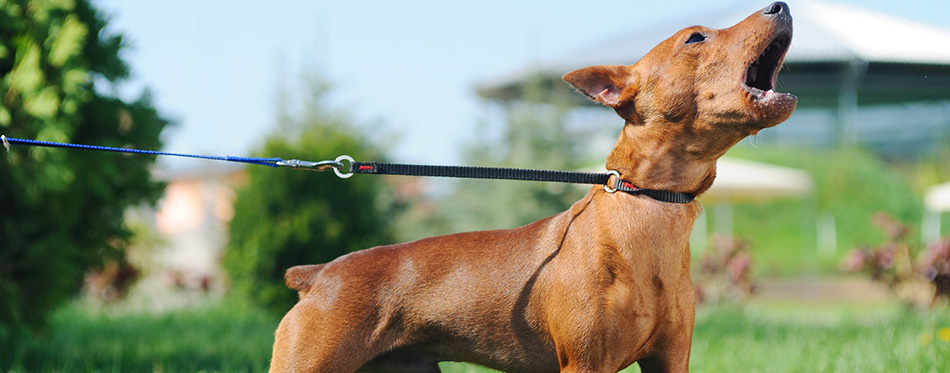All dogs bark for a variety of different reasons. It could be to express their enthusiasm and excitement. It could be a warning to back off. Or it could simply be a friendly greeting. While many dogs keep their barking under control, there are others that just won’t seem to stop. And this can prove to be a major problem in your household as it can be very disturbing for you, your family, and your neighbors. Also, it can be a problem for any other humans and animals who come into contact with your pooch.
Getting your dog’s barking under control can prove to be a major challenge, but it is one which is worth confronting head on. However, you need to make sure that the techniques that you are using are effective, and you are not risking making the problem worse in any way. So, in this blog post, we are going to help with a few possible solutions which you can attempt yourself. But first, let’s look closer at some of the main reasons that dogs bark.

Why Do Dogs Bark?
As we stated in the introduction, there are many different reasons that explain why do dogs bark. Let’s look at a few of the most common here to see if you can put your finger on which one is affecting your pooch.
- Greeting and Playing
Many dogs bark as a greeting when they encounter other animals and humans. There is something about this bark that should have a happy sound, and you will often see other positive behaviors such as their tail wagging and jumping.
- Warning and Protecting Territory
Dogs are territorial creatures, so they can often bark when they feel that someone is invading their home or personal space. If the threat continues and they feel that it is getting greater, the barking can get louder and more aggressive. It can be accompanied by bared teeth and a mean look on their face.
- Fear
The fear factor is another one which can lead to dogs barking. It can be at any noise or person who breaks them out of their state of calm. This kind of bark can happen anywhere and at any time, which is why it will often lead to you jumping as well!
- Boredom and Loneliness
A regular cause of problem barking is simply that your dog has been left alone at home, in the yard, outside a store, or anywhere else and they are crying out for attention. Their barking is just an expression of the unhappiness that they are feeling at the time. In more serious cases, dogs suffering from separation anxiety are much more likely to bark when left alone.
- Desire and Excitement
Another common reasons that a dog will bark is that they want something. For example, it could be that they are after a treat or that they can’t wait for you to take them out for a walk. This barking is often accompanied by jumping up and down or running around in circles.
A Few Points to Remember
Before we get onto the specific methods that you can use to stop your dog from barking, there are a few points which are worth remembering.
- Deal with the Problem Quickly
If your dog is a problem barker, you need to deal with the problem head on. Otherwise, it is likely to continue as it will become more ingrained in them. Old habits are hard to break. And if your dog barks when they seem strangers or other dogs, this can be a route to aggression.
- Never Yell at Your Dog
Though it can get very frustrating when your dog won’t stop barking, this is not an effective method of stopping the behavior. To a canine, your raised voice sounds like you are barking along with them and they are more likely to continue. So, keep your voice low and stay calm.
- Maintain a Positive Attitude
Training your dog out of barking all the time can be a time-consuming a frustrating task, but you need to maintain your positive attitude as best you can. Your dog is much more likely to learn quickly if you stay upbeat and cheery.
- Keep Consistent
When you are training your dog to do anything, you need to maintain a sense of consistency. Otherwise, you are simply going to confuse your pooch. Whenever your dog barks at the wrong time, you need to respond in the same way. And you have to do it all the time. Otherwise, they will not understand when it is right and when it is wrong.
Related Post: Dog Training Books

How to Train a Dog Not to Bark
Now we get onto the specific methods that you can use to stop your dog from barking. The techniques that you use may well end up depending on the root causes that are causing them to bark in the first place.
- Teach Your Dog the ‘Quiet’ Command
One of the most useful commands that you can teach your dog is the ‘quiet’ command. There are a couple of methods that you can use. The first may seem counter-intuitive, but it is to teach your dog to ‘speak’ first. When you say ‘speak’ and your dog barks a couple of times, you can then offer them a treat when they stop. Once your dog knows how to bark on command, you can then teach the ‘quiet’ command using treats and attention. Alternatively, you can just go directly into teaching them to be quiet. But you need to be especially careful not to reward them when they are barking as this is only going to send the wrong signals. With training, you can’t expect any shortcuts, so you should go in prepared to remain patient and keeping the long-term goal firmly in mind.
- Remove the Barking Motivation
Figuring out what is causing your dog to bark can go a long way towards helping the issue. If you know what it is, you can remove the motivation as a way of stopping the noise. For example, if your dog barks at people and animals outside the window, keep the curtains closed. Obviously, this avoidance strategy is not going to work for everything, but it can be useful as a starting point.
- Don’t Give Your Dog Positive Attention
Whenever your dog is barking, you shouldn’t give them any positive attention that is going to reinforce the behavior. For example, if they bark with excitement whenever you get the dog leash out to go for a walk, don’t put the leash on until they are sitting calmly. This method only works if you stay consistent in ignoring your dog, not touching or even looking at them. You are going to have to be patient in waiting out the barking. If you get frustrated and yell at your pooch, it could continue for longer next time.
- Tire Your Dog Out
Tired dogs generally don’t have the energy to bark all the time, so ensuring that they have enough physical stimulation can help out significantly. The amount of exercise that your dog requires depends on their age and breed. As well as taking them out for walks, you can also play with them at home, making sure that they have access to plenty of toys around the house. On top of the basic dog toys like balls and tug of war ropes, you could also try some more interactive treat-dispensing toys which present a mental challenge. The combination of physical and mental stimulants can act in tandem to tire your dog out and leave them without the energy to bark excessively.
- Hire a Dog Walker
If your dog barks because they are left alone for long periods of time, getting someone to come in during the day to walk your pooch can help out significantly. If you don’t have any neighbors or family members who can do the job, you can always hire a professional dog walker to take your dog out. This can help to provide the mental and physical stimulation that keeps them from going stir crazy at home.
- Go to a Dog Behavioral Expert
If nothing else seems to do the job, you may have to go to a dog behavioral expert in order to solve the problem. This is more likely if you have a pooch suffering from separation anxiety as they have some inbuilt trauma which is leading them to continue barking all the time.

Final Thoughts
Problem barking can be a difficult problem to solve, but it is one which is worth confronting head on. Otherwise, it is going to be harder to fix and it will lead to a more stressful homelife and a strained relationship with your little furry friend. If you can identify what is causing the problem to begin with, this is a good starting point. Hopefully, the techniques listed above give you a starting point in preventing your dog from barking all the time.
Sources:
- How to get your dog to stop barking – The Humane Society of the US
- How to Stop Territorial Barking – Cummings School of Veterinary Medicine
- DECODING YOUR DOG’S EXCESSIVE BARKING – VetMed Illinois

